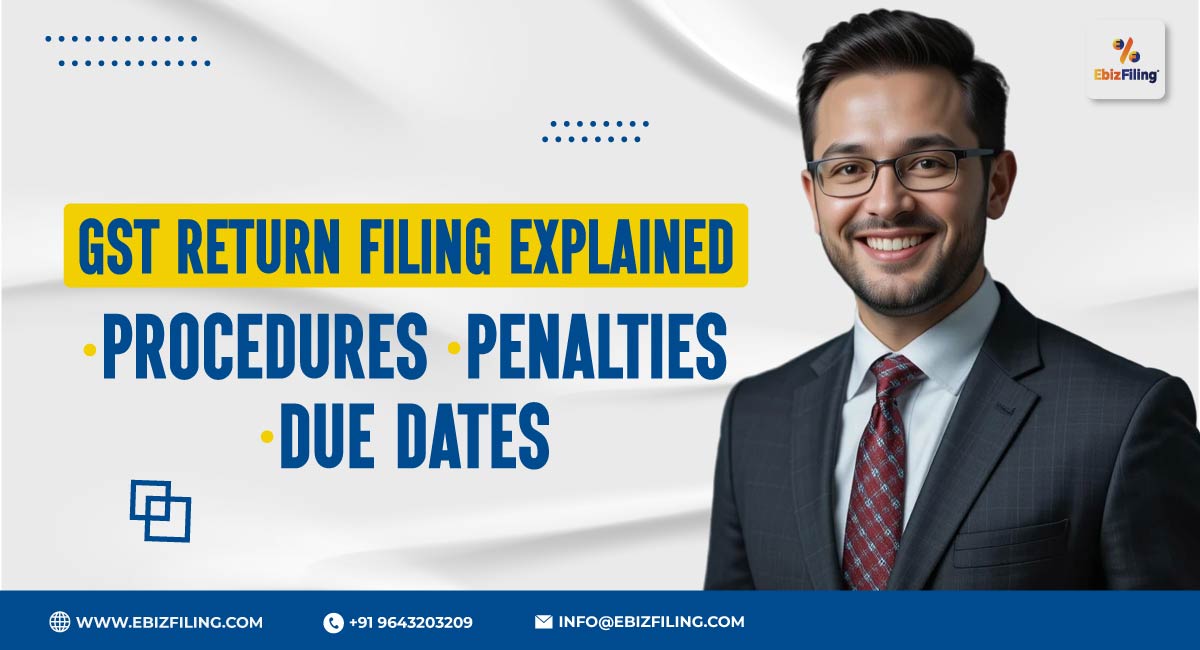
-
October 1, 2025
All About GST Return Filing in India
Introduction
GST return filing is a mandatory compliance for businesses registered under GST. It involves reporting details of sales, purchases, input tax credit, and tax liability to the government. Recently, the government has announced that if your turnover in a financial year is up to ₹2 crore, you are exempted from filing the annual GST return.
What is GST Return Filing?
GST return filing is the process of submitting details of outward and inward supplies, input tax credit (ITC), and tax payments to the GST portal. It helps maintain transparency and ensures that businesses meet compliance obligations under GST law.
Types of GST Returns
Here are the main types of GST returns that businesses must file:
-
GSTR 1 – Details of outward supplies (sales).
-
GSTR 3B – Summary of sales, purchases, ITC, and tax payment.
-
GSTR 4 – For taxpayers under the composition scheme.
-
GSTR 5 – For non-resident foreign taxpayers.
-
GSTR 6 – For input service distributors.
-
GSTR 7 – For authorities deducting TDS under GST.
-
GSTR 8 – For e-commerce operators collecting TCS.
-
GSTR 9 – Annual return for regular taxpayers.
-
GSTR 9C – Reconciliation statement and audit return for turnover above ₹2 crore.
Amendment on Annual GST Return
As per the latest update, taxpayers with annual turnover up to ₹2 crore are now exempted from filing the annual GST return (GSTR 9). This amendment has been made to reduce compliance pressure on small businesses, while larger businesses must continue filing GSTR 9 along with GSTR 9C where applicable.
GST Return Filing Process
-
Log in to the GST portal.
-
Select the type of return (monthly, quarterly, or annual).
-
Fill in details of sales, purchases, ITC, and tax payments.
-
Preview the return to check for errors.
-
Submit and make payment of tax, if applicable.
-
Download acknowledgment for records.
Due Dates for GST Return Filing
|
GST Return Type |
Due Date |
|
GSTR 1 |
11th of next month |
|
GSTR 3B |
20th of next month |
|
GSTR 4 |
18th of following quarter |
|
GSTR 5 & 5A |
20th of next month |
|
GSTR 6 |
13th of next month |
|
GSTR 7 |
10th of next month |
|
GSTR 8 |
10th of next month |
|
GSTR 9 |
31st December of following FY (Exempt up to ₹2 crore turnover) |
|
GSTR 9C |
31st December of following FY |
Penalties for Late GST Return Filing
-
₹50 per day (₹25 CGST + ₹25 SGST) for late filing.
-
₹20 per day for nil returns.
-
Interest at 18% per annum on unpaid tax.
Why Choose Ebizfiling for GST Return Filing?
-
Expert guidance for accurate filing.
-
Timely reminders for all due dates.
-
Error-free data reconciliation.
-
Affordable packages for startups, SMEs, and corporates.
-
Dedicated compliance support team.
Conclusion
GST return filing is an essential compliance requirement for all registered businesses. With the new exemption for businesses with turnover up to ₹2 crore, small businesses get relief, but others must continue filing accurately and on time. Ebizfiling helps businesses stay compliant and avoid penalties through expert GST return filing services.
Suggested Read :
Mandatory Compliances for a Private Limited Company in India
Step-by-Step Guide to GST Registration Process in India
Top Advantages of GST Registration for Businesses
GST Annual Return: Understanding GSTR-9 and GSTR-9C
Late Fees and Penalties for GST Return Filing
FAQs on GST Return Filing
1. What is GST return filing?
GST return filing is the process of reporting your business transactions to the government on the GST portal. It includes sales made, purchases done, tax collected, tax paid, and input tax credit (ITC) claimed. Filing ensures your tax liability is updated, and it helps the government track tax flow.
2. Who is required to file GST returns?
Every business registered under GST, whether small or large, has to file GST returns. The type of return depends on the category of taxpayer. For example, regular taxpayers file GSTR 1 and GSTR 3B, composition taxpayers file GSTR 4, and e-commerce operators file GSTR 8.
3. What is the latest exemption for GSTR 9?
The government has announced that businesses with an annual turnover of up to ₹2 crore are now exempted from filing GSTR 9, which is the annual return. This relief reduces compliance burden for small businesses, while bigger businesses must still file the annual return.
4. What are the different types of GST returns?
There are many GST returns, each serving a specific purpose. GSTR 1 reports outward sales, GSTR 3B is a monthly summary return, GSTR 7 is for TDS deductors, GSTR 8 is for e-commerce operators, GSTR 9 is the annual return, and GSTR 9C is for audit purposes. The return you file depends on your business type and turnover.
5. What happens if I delay GST return filing?
If you do not file your returns on time, you will have to pay late fees and interest. The late fee is ₹50 per day (₹25 under CGST + ₹25 under SGST). If it is a nil return, the fee is ₹20 per day. Interest at 18% per annum is also charged on the outstanding tax amount.
6. Can I revise a GST return after submission?
No, once a GST return is filed, it cannot be revised. If there are errors, they can only be corrected in the next return by adjusting figures. This is why accuracy is very important while filing.
7. Is GSTR 9 mandatory for all taxpayers?
No, GSTR 9 is not mandatory for everyone. Only regular taxpayers with turnover above ₹2 crore are required to file it. Small taxpayers with turnover up to ₹2 crore are exempt from filing it after the latest amendment.
8. What is GSTR 9C and who has to file it?
GSTR 9C is a reconciliation statement that compares your GST returns with your audited financial statements. It is required for businesses with turnover above ₹2 crore. It must be certified by a Chartered Accountant or Cost Accountant to ensure accuracy and compliance.
9. Why is professional help important for GST return filing?
Because GST returns are technical and cannot be revised once filed, even small mistakes can lead to penalties and notices. Professional help ensures your returns are accurate, filed on time, and compliant with the latest amendments, saving you time and risk.
10. How can Ebizfiling help me with GST return filing?
Ebizfiling offers expert GST return filing services for businesses of all sizes. Our team prepares and files your returns, keeps track of due dates, ensures compliance with new amendments, and helps you avoid penalties. This allows you to focus on running your business while we handle your compliance.
GST Return Filing
File error-free GST Return and in-time. Get your GST return filings done through experts ebizfiling.com.
About Ebizfiling -










Reviews
Addittya Tamhankar
21 Jul 2018EBIZFILING COMPANY IS GOOD. I APPRECIATE THEIR WORK, THEY HAVE BEEN VERY MUCH RESPONSIVE AND RESPONSIBLE, THEIR SERVICE COMES AT AN AFFORDABLE PRICE. TOO GOOD TO BELIEVE. KEEP ROCKING GUYS! GOD BLESS.
DEEPAK BAGRA
08 Sep 2018I find the service, working approach and commitments very professional. Their progress updates are commendable. I really liked working with them.
Lakshman Rajpurohit
28 May 2017We are looking for company who provides registration and process for SSI certificate. We contact ebizfiling and they have done job for us in a smooth way. we really appreciate their service and quick turn around time. Special Thanks to team of ebizfiling India pvt. ltd.
February 17, 2026 By Steffy A
Legal vs Accounting Services: What Businesses Often Confuse. Introduction. Many business owners assume that legal and financial services fall under the same category. However, legal vs accounting services involve different roles, expertise, and responsibilities.Understanding the difference helps businesses know when […]
December 19, 2025 By Dhruvi D
GSTR-5A Explained: What It Is and Why It Matters? Introduction When people hear the word GST, they usually assume it applies only to Indian businesses. Many foreign companies believe that if they are not registered in India or do not […]
June 26, 2025 By Team Ebizfiling
LUT Renewal FY 2025-26: GST Exporter’s Checklist Introduction If you’re an exporter in India, you need to submit a Letter of Undertaking (LUT) each year to avoid paying IGST upfront on your exports. This is a facility given under Section […]